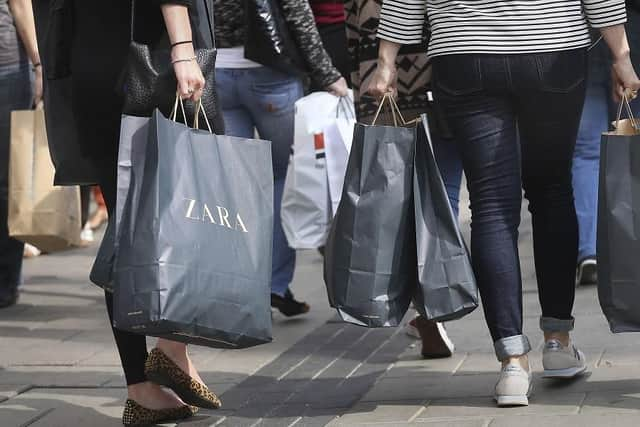Inflation drives retail sales growth but shopper budgets remain under pressure
The latest BRC-KPMG monthly retail sales monitor reported that retail sales grew 5.1 per cent in April, compared with a 0.3 per cent decline in the same month last year.
However, the industry experts highlighted that although customers spent more, the volume of items bought by shoppers was lower as inflation continues to weigh on budgets.
Advertisement
Hide AdAdvertisement
Hide AdThe Office for National Statistics (ONS) said UK inflation hit 10.1 per cent in March, amid record food and drink inflation at 19.1 per cent.


The new data showed that retailers said food sales increased by 9.8 per cent over the three months to April, driven by jumps in price, with sales volumes actually lower for the period.
Meanwhile, non-food stores saw a 1.2 per cent sales increase over the three-month period to April, amid pressure on fashion retailers.
Helen Dickinson, chief executive of the British Retail Consortium, said: "While retail sales grew in April, overall inflation meant volumes were down for both food and non-food as customers continued to adjust spending habits.
Advertisement
Hide AdAdvertisement
Hide Ad"Clothing sales underperformed as the poor weather left customers thinking twice before decking out their summer wardrobe.
"Meanwhile, a boost to overseas tourism over Easter helped jewellery, watches and cosmetics."
Paul Martin, UK head of retail at KPMG, said: "Consumer demand has so far been fairly resilient to the twin drags of high inflation and high interest rates, but as government energy support comes to an end for many, savings start to dwindle and other household bills rise, it is likely that the next few months will continue to be challenging as the consumer tank empties.
"Much hinges on whether soaring food inflation can be brought under control enough to allow consumers to comfortably start spending again on non-essential items."
Advertisement
Hide AdAdvertisement
Hide AdMeanwhile, consumer card spending growth grew just 4.3 per cent year-on-year in April, according to a new report from Barclays.
This was less than half the latest CPIH rate (the Consumer Prices Index including owner occupiers’ housing costs) of 8.9 per cent but slightly higher than four per cent growth in March.
However, the arrival of spring and the Easter Bank Holiday weekend fuelled growth at pubs and sports & outdoor retailers, while ticket sales for the Eurovision Song Contest in Liverpool boosted the entertainment sector.
Spending on fuel fell by 9.3 per cent, due to falling petrol and diesel prices, especially compared to April 2022, when they were much higher due to the Russian invasion of Ukraine.
Advertisement
Hide AdAdvertisement
Hide AdMeanwhile, public transport spending grew 11.9 per cent compared to the same period last year, when fewer Brits were commuting to the office due to lingering concerns around the spread of Covid-19.
Spending on utilities saw less of a year-on-year uplift at 34.4 per cent compared to 39.3 per cent in March, largely due to the energy price cap increase in April 2022.
Abbas Khan, UK economist at Barclays, said: “The data suggests that pockets of the economy, particularly the leisure sector, enjoyed some renewed momentum in April.”